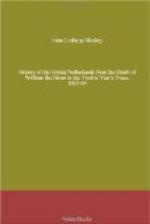Such an incident could hardly predispose the ambassador in favour of the nation he was about to visit, or strengthen his hope of laying, not only the foundation of a perpetual friendship between the two crowns, but of effecting the palingenesis of Europe. Yet no doubt Sully—as the world has so long learned to call him—was actuated by lofty sentiments in many respects in advance of his age. Although a brilliant and successful campaigner in his youth, he detested war, and looked down with contempt at political systems which had not yet invented anything better than gunpowder for the arbitrament of international disputes. Instead of war being an occasional method of obtaining peace, it pained him to think that peace seemed only a process for arriving at war. Surely it was no epigram in those days, but the simplest statement of commonplace fact, that war was the normal condition of Christians. Alas will it be maintained that in the two and a half centuries which have since elapsed the world has made much progress in a higher direction? Is there yet any appeal among the most civilized nations except to the logic of the largest battalions and the eloquence of the biggest guns?
De Rosny came to be the harbinger of a political millennium, and he heartily despised war. The schemes, nevertheless, which were as much his own as his master’s, and which he was instructed to lay before the English monarch as exclusively his own, would have required thirty years of successful and tremendous warfare before they could have a beginning of development.
It is not surprising that so philosophical a mind as his, while still inclining to pacific designs, should have been led by what met his eyes and ears to some rather severe generalizations.
“It is certain that the English hate us,” he said, “and with a hatred so strong and so general that one is tempted to place it among the natural dispositions of this people. Yet it is rather the effect of their pride and their presumption; since there is no nation in Europe more haughty, more disdainful, more besotted with the idea of its own excellence. If you were to take their word for it, mind and reason are only found with them; they adore all their opinions and despise those of all other nations; and it never occurs to them to listen to others, or to doubt themselves . . . . . Examine what are called with them maxims of state; you will find nothing but the laws of pride itself, adopted through arrogance or through indolence.”
“Placed by nature amidst the tempestuous and variable ocean,” he wrote to his sovereign, “they are as shifting, as impetuous, as changeable as its waves. So self-contradictory and so inconsistent are their actions almost in the same instant as to make it impossible that they should proceed from the same persons and the same mind. Agitated and urged by their pride and arrogance alone, they take all their imaginations and extravagances for truths and realities; the objects of their desires and affections for inevitable events; not balancing and measuring those desires with the actual condition of things, nor with the character of the people with whom they have to deal.”




